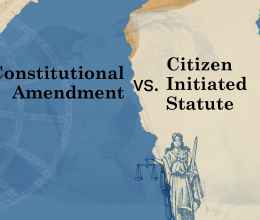Chairman Manning, Vice Chair Reynolds, Ranking Member Hicks-Hudson, and members of the Senate Judiciary Committee:
My name is Patrick Higgins, and I have the pleasure of serving as Policy Counsel at the ACLU of Ohio. Thank you for the opportunity to present testimony in support of Senate Bill 37.
The ACLU of Ohio Supports Senate Bill 37 because it is a stride in addressing flaw in existing law regarding how our state addresses drug offenses. Simply put, this is smart policy in that it ends driver’s license suspensions for many offenses that have nothing to do with driving. Restricting a person’s mobility for wholly unrelated offenses is antithetical to what I believe is a goal shared between supporters of Senate Bill 37 and this Committee: a legal system that allows all Ohioans to prosper.
As Senate Bill 37’s sponsors pointed out last week, Ohio’s current driver’s license suspension penalties set many of our neighbors up to fail because such penalties quickly become insurmountable to people who need to get to work, to their doctor, and to pick their children up from school. We live in an Ohio where 82% of us drive to work and only 1.4% rely on public transit1. The time for the changes contained in Senate Bill 37 is now, and I encourage you to support it.
While Senate Bill 37 is a stride in addressing flaws in our current system, there remains more to be done. It is for this reason that I encourage you to consider the following changes to improve this important legislation:
- End the state’s use of debt-related driving restrictions.
- Ohio is among a shrinking number of states using debt-related driving restrictions. This number is shrinking because of a growing recognition that millions of people nationwide are struggling to survive with debt-related driving restrictions just because they could not afford a court fine or fee or because they missed a court hearing2. We know that these suspensions are counterproductive to improving collection outcomes3. We also know that the heaviest weight of this ineffective policy falls most heavily on communities where people of color make up more of the population4.
- End suspensions for all offenses unrelated to driving.
- The as-introduced version of the bill leaves suspensions for 14 drugrelated offenses intact5. These include five fourth degree felonies and two fifth degree felonies. Limiting drug-related driver’s license suspensions to the highest degree felony convictions is a start, but this legislation can go further to make sure that driver’s license suspensions are limited to driving-related offenses.
You have a unique opportunity in this moment of time, General Assembly, and Committee. Over the course of years, Ohio has been slowly untangling the quagmire of driver’s licenses suspensions in a way that gets more of us right with the law and on the road to health, education, family, and work. Senate Bill 37 is the right vehicle for these important changes, and I encourage you to keep driving. The ACLU of Ohio stands ready to be of assistance in improving this legislation, and I am happy to answer any questions that you have.








